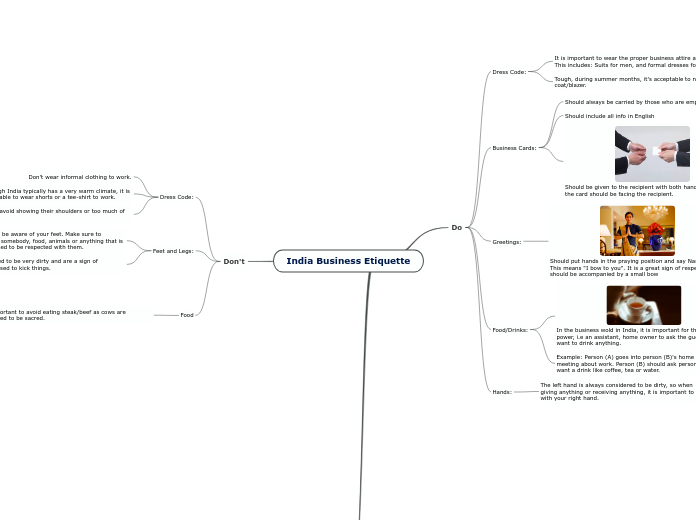India Business Etiquette
Do
Dress Code:
It is important to wear the proper business attire at work
This includes: Suits for men, and formal dresses for women
Tough, during summer months, it's acceptable to not wear a coat/blazer.
Business Cards:
Should always be carried by those who are employed.
Should include all info in English
Should be given to the recipient with both hand. The front of the card should be facing the recipient.
Greetings:
Should put hands in the praying position and say Namaste. This means "I bow to you". It is a great sign of respect and should be accompanied by a small bow
Food/Drinks:
In the business wold in India, it is important for those with power, i.e an assistant, home owner to ask the guest if they want to drink anything.
Example: Person (A) goes into person (B)'s home for a meeting about work. Person (B) should ask person (A) is they want a drink like coffee, tea or water.
Hands:
The left hand is always considered to be dirty, so when
giving anything or receiving anything, it is important to do so
with your right hand.
Work Cited:
https://asialinkbusiness.com.au/india/conducting-business-in-india/indian-business-culture-and-business-etiquette?doNothing=1 (THIS LINK DOESN'T HAVE THE REQUIRED INFO FOR A MLA FORMAT)
Business.Com, 2020, https://www.business.com/articles/so-international-business-etiquette-from-around-the-world/. Accessed 14 Oct 2020.
Don't
Dress Code:
Don't wear informal clothing to work.
Even though India typically has a very warm climate, it is
not acceptable to wear shorts or a tee-shirt to work.
Women should avoid showing their shoulders or too much of their legs.
Feet and Legs:
Always be aware of your feet. Make sure to
not hit somebody, food, animals or anything that is
supposed to be respected with them.
Feet are considered to be very dirty and are a sign of disrespect when used to kick things.
Food
It is important to avoid eating steak/beef as cows are considered to be sacred.
In the Vedas, the oldest of the Hindu scriptures, the cow is associated with Aditi, the mother of all the gods.
